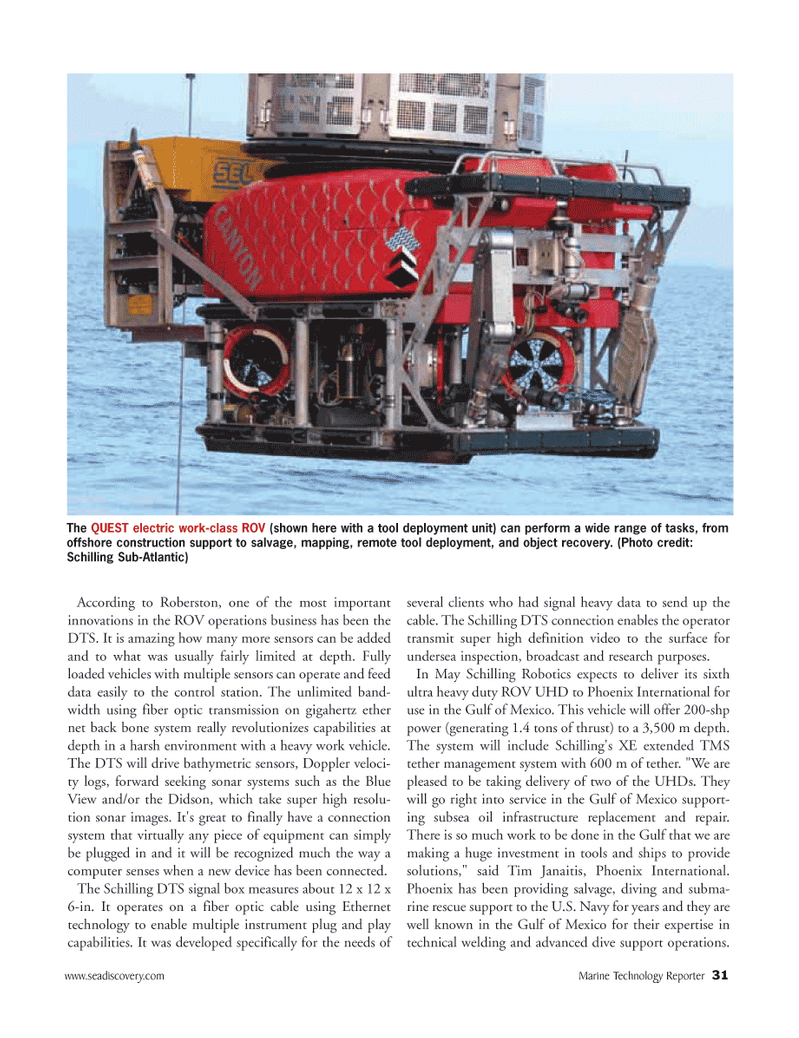
Page 31: of Marine Technology Magazine (April 2006)
The Offshore Technology Edition
Read this page in Pdf, Flash or Html5 edition of April 2006 Marine Technology Magazine
www.seadiscovery.com Marine Technology Reporter 31
According to Roberston, one of the most important innovations in the ROV operations business has been the
DTS. It is amazing how many more sensors can be added and to what was usually fairly limited at depth. Fully loaded vehicles with multiple sensors can operate and feed data easily to the control station. The unlimited band- width using fiber optic transmission on gigahertz ether net back bone system really revolutionizes capabilities at depth in a harsh environment with a heavy work vehicle.
The DTS will drive bathymetric sensors, Doppler veloci- ty logs, forward seeking sonar systems such as the Blue
View and/or the Didson, which take super high resolu- tion sonar images. It's great to finally have a connection system that virtually any piece of equipment can simply be plugged in and it will be recognized much the way a computer senses when a new device has been connected.
The Schilling DTS signal box measures about 12 x 12 x 6-in. It operates on a fiber optic cable using Ethernet technology to enable multiple instrument plug and play capabilities. It was developed specifically for the needs of several clients who had signal heavy data to send up the cable. The Schilling DTS connection enables the operator transmit super high definition video to the surface for undersea inspection, broadcast and research purposes.
In May Schilling Robotics expects to deliver its sixth ultra heavy duty ROV UHD to Phoenix International for use in the Gulf of Mexico. This vehicle will offer 200-shp power (generating 1.4 tons of thrust) to a 3,500 m depth.
The system will include Schilling's XE extended TMS tether management system with 600 m of tether. "We are pleased to be taking delivery of two of the UHDs. They will go right into service in the Gulf of Mexico support- ing subsea oil infrastructure replacement and repair.
There is so much work to be done in the Gulf that we are making a huge investment in tools and ships to provide solutions," said Tim Janaitis, Phoenix International.
Phoenix has been providing salvage, diving and subma- rine rescue support to the U.S. Navy for years and they are well known in the Gulf of Mexico for their expertise in technical welding and advanced dive support operations.
The QUEST electric work-class ROV (shown here with a tool deployment unit) can perform a wide range of tasks, from offshore construction support to salvage, mapping, remote tool deployment, and object recovery. (Photo credit:
Schilling Sub-Atlantic)
MTR#3 (17-32).qxd 4/7/2006 11:34 AM Page 31

 30
30

 32
32
